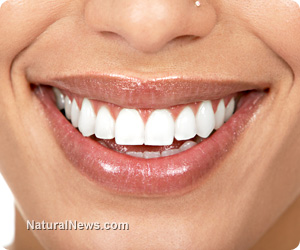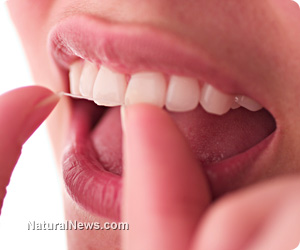
(NaturalNews) Stem cell technology is promising in many respects and nowhere is that more evident than in the field of dentistry where painful root canals could become a thing of the past if promising advances in treating tooth decay pan out.
According to The Wall Street Journal, scientists have made advances in restoring tooth pulp, which would negate having to perform root canals. Per the paper:
Several recent studies have demonstrated in animals that procedures involving tooth stem cells appear to regrow the critical, living tooth tissue known as pulp. Treatments that prompt the body to regrow its own tissues and organs are known broadly as regenerative medicine. There is significant interest in figuring out how to implement this knowledge to help the many people with cavities and disease that lead to tooth loss.
Elimination of root canals?
That's important because, according to statistics, half of children in the U.S. have at least one cavity by the time they're 15 years old; in adults, a quarter of those over the age of 65 have lost all their teeth. The Centers for Disease Control and Prevention says that Americans spent $108 billion on dental care in 2010, a figure which includes elective and out-of-pocket care.
Tooth decay occurs when infections or bacteria outstrip a tooth's natural ability to heal or repair itself. If the damage eventually causes too much erosion of the hard, outer enamel shell and penetrates the tooth, eventually the infection can kill off the soft pulp tissue inside, which makes removal of the tooth or a root canal to repair the damage necessary. Pulp is essential in detecting sensation - heat, cold, pressure - and it is where the stem cells ("undifferentiated cells that turn into specialized ones," WSJ reported) that can regenerate tooth tissue are located.
Researchers from all over the world - the U.S., Japan, South Korea and the U.K., among others - have been working to figure out how to make stem cells regenerate pulp. Right now the research is in its early stages, but if a technique can be found "it could mean a reduction or even elimination of the need for painful root canals," the paper said.
Root canals deal with the tooth's infection but they are not a cure-all, per se, WSJ reports:
While the affected tooth remains in the mouth, it is essentially dead, which could impact functions like chewing. That also means no living nerves remain in the tooth to detect further decay or infection. Infection could subsequently spread to surrounding tissue without detection. An estimated 15.1 million root canals are performed in the U.S. annually, according to a 2005-06 survey by the American Dental Association, the most recent data available.
'Public health issue'
"The whole concept of going for pulp regeneration is that you will try and retain a vital tooth, a tooth that is alive," Tony Smith, a professor in oral biology at the University of Birmingham in the U.K., told the paper. "That means the tooth's natural defense mechanisms will still be there."
He adds: "I think we are really just at the opening stages of what is going to be a very exciting time, because we're moving away from traditional root-canal treatments."
Misako Nakashima, DDS, Ph.D., of the National Center for Geriatrics and Gerontology in Obu, Japan, says the dental stem cell research addresses an important "public health issue."
"Dental cavities and inflammation of the surrounding pulp is a challenging public health issue, as tooth decay not only can cause a patient great pain but it also can lead to other serious health issues including heart disease," he told AlphaMed Press.
"Other studies demonstrated the therapeutic effects and safety of mesenchymal stem cells (MSCs) for various diseases. There have been no preclinical reports, however, to support the use of pulp stem cells as a potential treatment for pulpitis in clinical trials," he continued. "We also knew that previous studies involving the spinal cord show that combining G-CSF with stem cells derived from other types of tissues, bone marrow stromal cells, neuronal stem cells and amniotic fluid stem cells had several benefits. So we reasoned that G-CSF might positively impact the pulp stem cells, too."
Though in the early stages, using stem cell therapies to treat dental problems looks promising.
Sources:
http://online.wsj.com
http://www.prweb.com
http://www.ncbi.nlm.nih.gov
Learn more: http://www.naturalnews.com/041111_stem_cells_root_canals_dentistry.html#ixzz3ldzC2V7Z

(NaturalNews) Could you imagine going to the dentist's office and handing them a urine sample so they could grow you a new tooth? Within weeks, stem cells from your urine could be birthing a tooth right in your own mouth.
This is exactly what Chinese researchers are onto. Using cells generated from urine, researchers have found a way to isolate important stem cell subsets, implant them into a jawline, and generate structures similar to human teeth. Stem cells from urine are on the verge of become the new building blocks for tooth implants, as orthodontists may one day be able 'seed' new tooth growths in the jaws of patients who need a transplant.
"These cells can be obtained through a simple, non-invasive low-cost approach that avoids surgical procedures," said Yuanyuan Zhang, M.D., Ph.D., assistant professor of regenerative medicine and senior researcher on the project.
Reported in the journal Stem Cells, urine stem cells could be used for a variety of regenerative functions. They have been studied to effectively generate cells that line the bladder, could alternatively be used to form fat, muscle, and nerve cells, and could even be used to form bone and cartilage.
So far, Zhang's research is proving that urine stem cells may be the safest to use out of all human stem cells, especially embryonic stem cells which can form tumors when implanted in the body. According to Zhang's team, urine stem cells do not form tumors like embryonic stem cells. Zhang and his team isolated the special urine stem cells in 2006, learning that they originate from the upper urinary tract. Their discovery has inspired further research, as scientists begin moving away from the controversial use of embryonic stem cells.
Teeth generated from urine involves a growth process that takes about three weeks. The science is still in its infant stages, though, as the 'tooth structures' only resemble real teeth. According to the researchers at the Guangzhou Institutes of Biomedicine and Health, actual human urine pluripotent stem cells (iPSCs) can be used to create different cell types that mimic tooth components like dentin, enamel, cementum and pulp, but the strength of these teeth is far from the strength of normal, healthy teeth.
The results of their latest research, published in the journal Cell Regeneration, explain how the researchers transplanted urine stem cells into mice, effectively growing teeth in their jaws similar to human teeth. The major setback they faced was that they were only able to generate teeth about a third of the strength of regular human teeth. On top of that, they are only having about a 30 percent success rate.
For the experiment to be more successful in humans, they believe in using a patient's own urine stem cells. By using a patient's own stem cells, there may be a lesser chance that the patient's body would reject the implanted cells. Bodies typically reject foreign cells.
Scientists are just now experimenting with urine stem cells, but generating strong teeth that connect with nerve and blood vessels may be a hard feat to accomplish.
Prof. Mason, scientist at University College London, "The big challenge here is the teeth have got a pulp with nerve and blood vessels which have to make sure they integrate to get permanent teeth."
Prof. Chris Mason believes urine is one of the worst sources for stem cell research. He says that the risk of bacterial contamination is higher in these cells.
"It is probably one of the worst sources, there are very few cells in the first place and the efficiency of turning them into stem cells is very low.
"You just wouldn't do it in this way."
Sources for this article include:
http://www.bbc.co.uk
http://www.voanews.com
http://news.discovery.com
http://www.sciencedaily.com
Learn more: http://www.naturalnews.com/041522_stem_cells_urine_tooth_regeneration.html#ixzz3le2Svp5Q
fetched in 1.2051 sec, IP =3.143.144.209, y=1